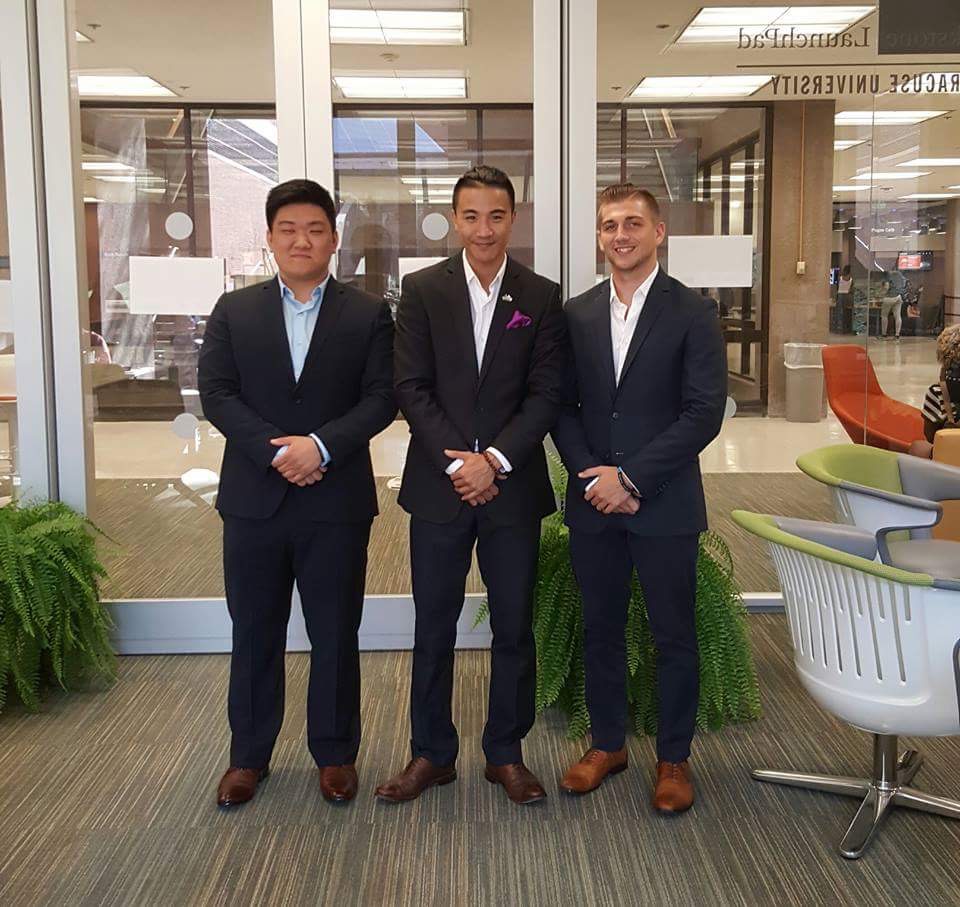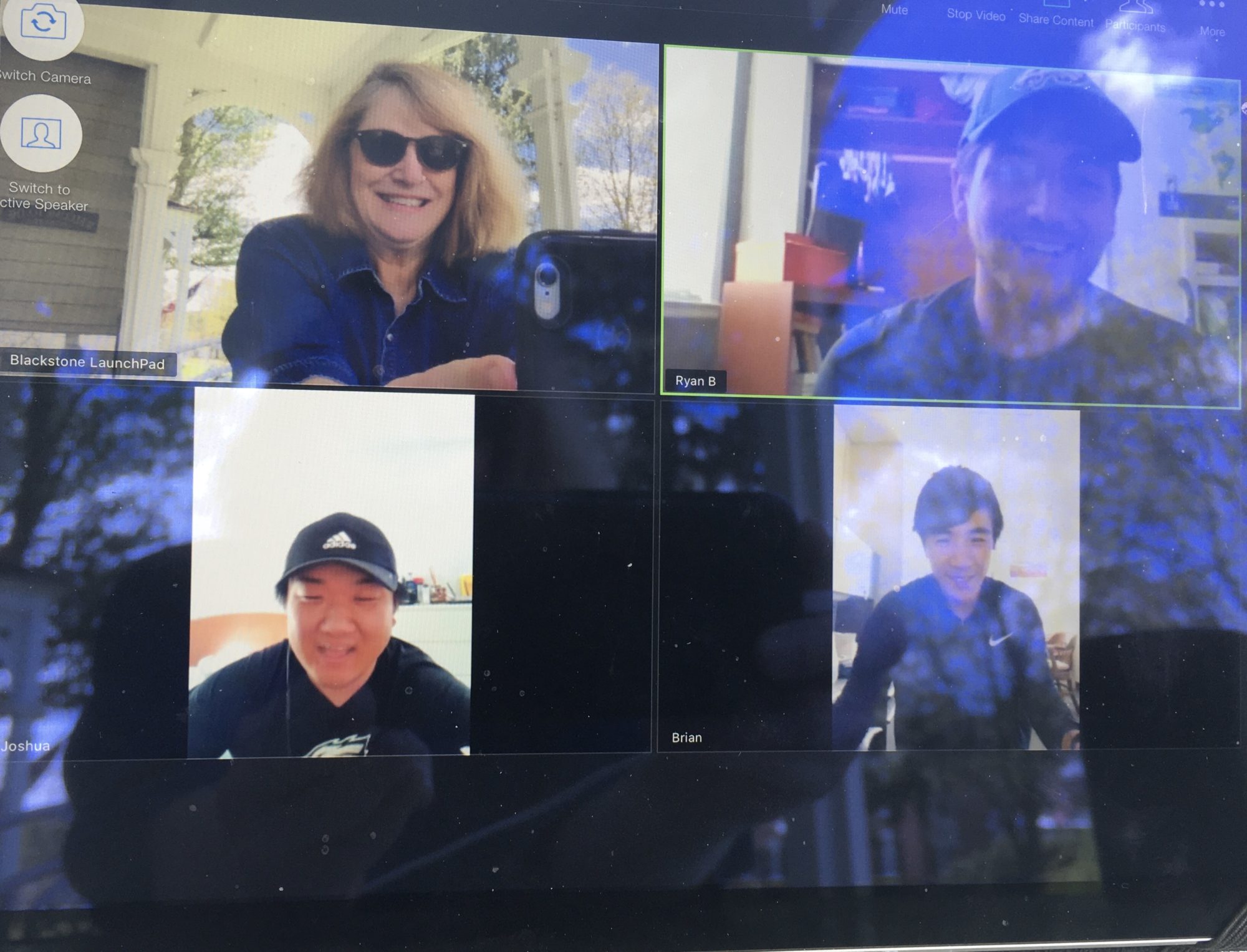
When the Blackstone LaunchPad first opened its doors in April 2016, one of their first student ventures was Thrive which grew into a nonprofit focused on providing portable energy solutions and sustainability education in Nepal. It was co-founded by international relations student Brian Kam (’16 Maxwell) with economics and policy studies student Ryan Brinkerhoff (’16 Maxwell) and biology student Joshua Moon (’16 Arts and Sciences). Four years later, the team is still working with the LaunchPad, now as alumni mentors, and sharing their story with others interested in impact entrepreneurship.
Thrive’s story began in January 2016, half a year after Kam spent a summer doing relief work in Nepal in the wake of a devastating earthquake. Inspired to do more, he enlisted his friends Brinkerhoff and Moon, and walked into the LaunchPad with help becoming incorporated, getting federal charitable status, creating a business model and raising seed funds to launch their first pilot project in Nepal.

Since graduation, Thrive has grown into a mission-driven nonprofit that created many sustainability and workforce development projects working with high schools, colleges and community groups in Nepal to create concrete impact. Thrive’s renown and reputation for success has grown so much that they have been included in an academic journal as a case study this past year. Socio-Tech Innovation: Harnessing Technology for Social Good, is an academic journal studying successful models of entrepreneurship and technological innovation for social good. Headed by The New School, a university in New York City with a strong emphasis in social research and pioneering paths, this book features successful social ventures, for example Thrive, in order to analyze the steps and factors of creating long-lasting, impactful companies for social good.
Thrive was first approached to publish in this journal when Kam, Brinkerhoff, and Moon were invited to attend the First International Conference on Social Entrepreneurship hosted at King’s College in Kathmandu, Nepal. They hosted a presentation and sat on a panel surrounding their work in Nepal after the massive 2015 earthquake struck Nepal which caused widespread devastation. The Thrive team ended up spending years supporting communities in Nepal in the rebuilding and aftermath of the tragedy. The project was of great interest at the conference.
A professor from India, intrigued and impressed by Thrive’s work, approached the team and invited them to write a case study in the upcoming Socio-Tech Innovation journal. After spending a year and half writing their observations about the needs and developments in Nepal and Thrive’s work in addressing them, the case study underwent a peer review process by professors gathered from universities across the world and was accepted into the book with only a single edit.
One of the major themes of the book is how social ventures successfully scale-up, as sustained growth can be a significant problem for nonprofits or social companies. Brinkerhoff identifies this problem as having little room to fail for non-profits. If for-profits fail to meet their goals, they generally still have some amount of money from sales to work from and can maneuver enough to survive. When nonprofits undertake charitable projects that are not successful, they can only rely on their donors and collaborative partners to try again. “The primary challenge is to generate funding,” said Brinkerhoff.
He credits Thrive’s ability to scale-up in part due to the business competitions the LaunchPad hosted, as well as their success at the New York State Business Plan Competition, and the team’s commitment to partner with other nonprofits to undertake their projects.
The team attributes the journey of Thrive from a small startup to a company invited to participate in an international conference and publish in an academic journal to their business model of engaging local Nepali communities in their work. Too often, nonprofits bring to a community or country that needs assistance a concrete plan of the needed solution and how to distribute it in that area. However, nonprofits often fail to recognize that one solution will not work the same across different communities, because different areas have unique problems and needs; and that humans don’t want to simply be handed products to fix their lives but they actually want to be engaged and play a role in transforming their community.
The current model many nonprofits take of independently designing a solution and doling it out where they see problems can often result in tensions and resentment across communities and fail to adequately address or mitigate problems.
Thrive realized that their products and solutions needed to be tailored individually to each community and seeks to do that by partnering with educators and researchers in each area they work in to ensure their solutions are effectively implemented. “Social entrepreneurship needs to realize that the first instinct isn’t the best way to do it. It is about learning as much as you teach, and always being open to doing things differently,” said Brinkerhoff.
Thrive’s path from an idea to help Nepal to an impactful nonprofit featured in a book studying successful social innovation is one that speaks to the dedication of Kam, Brinkerhoff, and Moon in truly understanding community’s needs and implementing helpful solutions. Their drive and path to truly helping others is one that showcases a successful and modern model for social entrepreneurship.
The team has currently put a pause on their work in Nepal to focus on professional development. Kam just completed a nursing degree at the University of Rochester, Brinkerhoff just finished his second year of law school at Rutgers and Moon just completed his Medical College Admission Test® (MCAT®) and is in the process of starting medical school. The goal is to take their Thrive experience and put to work in the areas of public policy, public health, and global initiatives – putting their academic foundations and entrepreneurial experiences to work.
They continue to be active members of the LaunchPad as members of the Founder’s Circle, and as mentors.

Story by LaunchPad Global Media Fellow Claire Howard